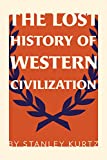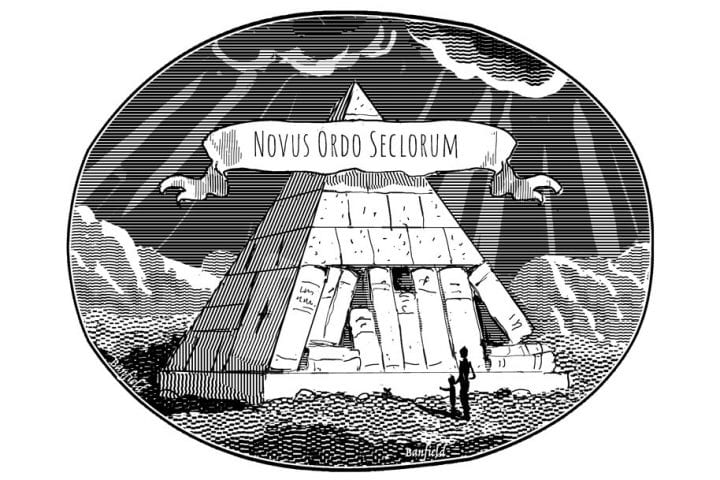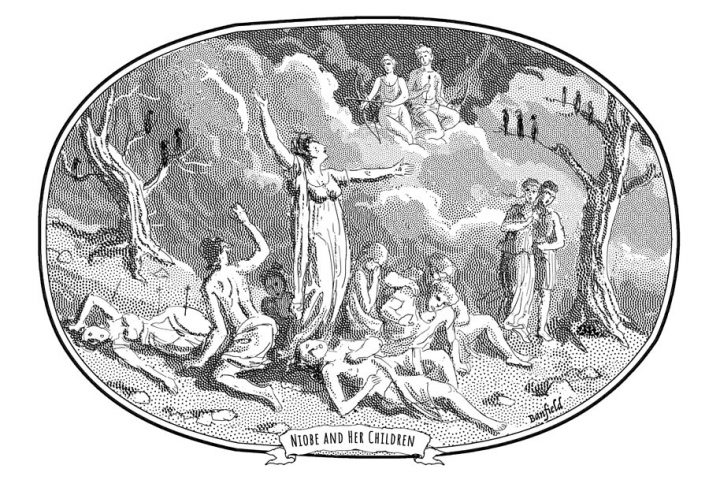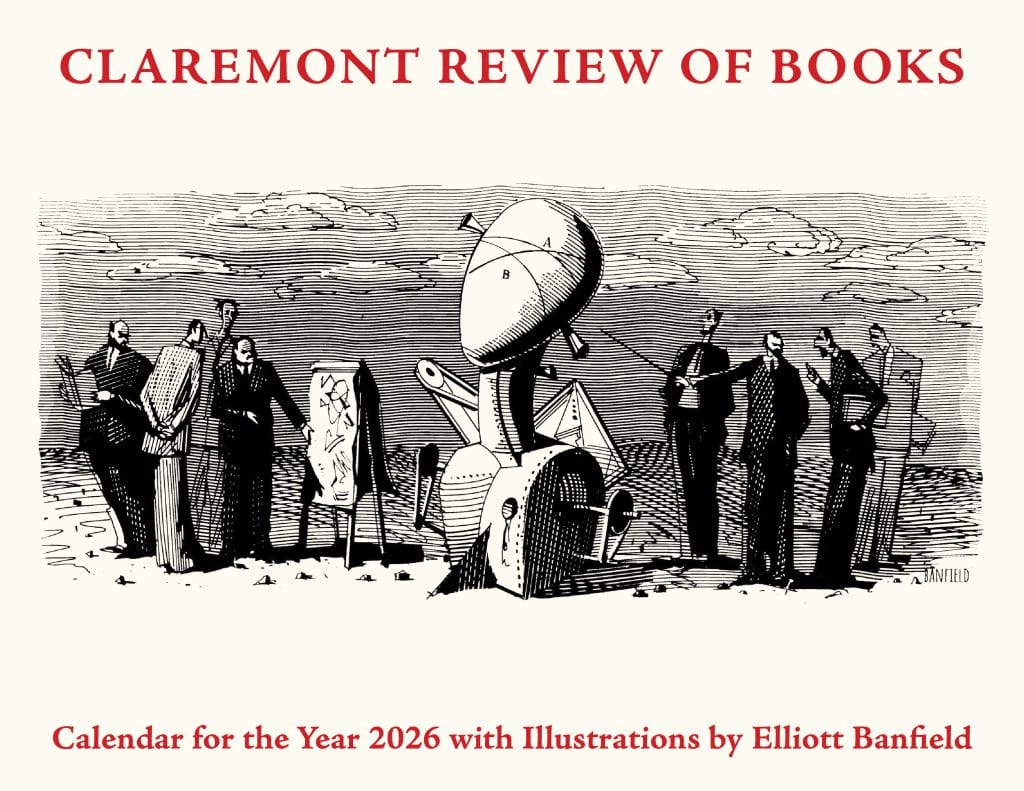Books Reviewed
As everybody knows, the battle pitting Great Books against Bad Books or No Books has been raging for a long time now. As everybody also knows, the results on most campuses are grim. “Comparative literature” often no longer means reading literature, but subjecting oneself to cryptic and endlessly self-referential “interpretations” of “texts.” The metastasizing “Studies” majors—Women, Latino, Fat, Gender, Queer & Co.—are neither major, nor about real study. “Trigger-happy” has acquired a whole new meaning. Of course there were, and still are, safe spaces in the course catalogue for aficionados of the humanities. But the long march of multiculturalism has plenty of victories to show.
Also to the shock of no one, this parlous reality has generated profound and continuing concern. Thus, Allan Bloom in his bestselling book, The Closing of the American Mind (1987), and many other conservatives since have pointed to the dangers radical relativism poses for American students, for the life of the mind, for the country. Liberals like Arthur Schlesinger, Jr., and Mark Lilla have worried over what multiculturalism and its kissing cousin, identity politics, have been doing to liberalism itself. Right or Left, critics have tended to focus less on the creed of multiculturalism per se than on its political and other effects. What has gone largely unexamined is another question: whether “multiculturalism” ever made sense on its own terms—i.e., whether the creation story it came to tell of itself even holds up.
With The Lost History of Western Civilization, published by the National Association of Scholars, Stanley Kurtz has now delivered that crucial missing piece.
* * *
It is a task to which he brings sterling credentials. CRB readers, among others, will already know Kurtz as a prolific public intellectual long affiliated with the Ethics and Public Policy Center. In addition to his essays and short pieces for many journals and magazines, he is also the author of several books, among them the single best account of the 44th president’s ideological formation, Radical-in-Chief: Barack Obama and the Untold Story of American Socialism (2010).
Perhaps less well-known—and vital to the success of his new book—is Kurtz’s extensive academic experience, which includes appointments at some of the most elite campuses in the United States. An anthropologist by training with a Ph.D. in social anthropology from Harvard, Kurtz garnered numerous awards during his years on the quads. These include, from Harvard alone, several certificates of honor, a nomination for best junior faculty member, and two coveted Hoopes Awards for undergraduate teaching. He also majored in religion at Haverford College, did some graduate work at Berkeley, and taught at the University of Chicago under the prestigious rubric of Dewey Prize Lecturer in Psychology. In all, few writers could be better positioned to trace the epidemiology of what has become, thanks to multiculturalism, Toxic U.
* * *
The Lost History of Western Civilization uses synecdoche to trace the pathogen’s course. Today’s riven politics, argues Kurtz, were shaped decisively by the divisions and outcome of the famous curricular battle that took place at Stanford University in 1987. Led by Jesse Jackson, hundreds of students marched in protest against the core requirement in Western Culture, chanting, “Hey, hey, ho, ho, Western Civ has got to go!” What appeared back then to be a struggle over updating reading lists in the name of “diversity” turned out instead to be a decisive confrontation in the culture wars: one that pitted traditional American conceptions of history and citizenship against “the new multicultural way.” Under the latter’s influence, the Great Books came to be dismissed as one form or another of neocolonial subterfuge; the ideas of nation, culture, and civilization were dismissed as similarly suspect; and the grievance coalition spearheaded during the Stanford fight by Jackson would go on to spread these toxins not only on campuses, but throughout the left wing of the Democratic Party and beyond, including into the Rabelaisian excesses known today as “cancel culture.”
But why? As Kurtz documents in clinical detail, the new animus toward the canon depended on the notion that the thing called “Western civilization” was no longstanding “thick” concept (as the social scientists say), but instead a “thin” modern invention of American militarism—created during World War I, it was proposed, as a way of tempting U.S. soldiers to fight and die in the European theater. This theory originated with University of New Brunswick historian Gilbert Allardyce, whose contentions in a 1982 essay about “The Rise and Fall of the Western Civilization Course” became essential for multiculturalists. Allardyce argued that courses in Western civilization as such—which proliferated on campuses after World War I until the Vietnam war—originated in the War Issues Course of the World War I Student Army Training Corps. In other words, the very idea of shared civilizational kinship between the United States and the Continent was born in perfidious militarism. So ubiquitous has the Allardyce theory become among multiculturalists during the past several decades that its provenance has gone almost entirely unquestioned—until Kurtz. “The conviction that Western Civilization is merely an ‘invented tradition’ is an awesome and venerable idol in the temple of deconstructionist history,” he observes. “That idol is ripe for smashing.”
* * *
At last, a statue worth pulling down. As the author shows, in short order, Allardyce’s theory about the “invention” of the West was quickly proclaimed as fact, used against traditional curricula, and expanded by other scholar-activists. These included historian Lawrence Levine, whose 1997 book The Opening of the American Mind was both a riposte to Bloom and a new manifesto for multiculturalism. Echoing Allardyce, he repeated the incantation on which the abolition of the Great Books depended: that “[t]he Western Civ curriculum….was a twentieth-century phenomenon which had its origins in a wartime government initiative, and its heyday lasted for scarcely fifty years,” as Levine put it.
Kurtz’s razing of this claim is thorough and entertaining. Along the way, he offers absorbing glimpses into some of the A-team minds of modernity. Beginning with the Baron de Montesquieu’s The Spirit of the Laws (1748), he argues, the “core themes” of what would later become Western civilization studies were already established. They continued on through the Scottish Enlightenment, including Adam Ferguson’s Essay on the History of Civil Society (1767)—the first known document to use the word “civilization” in English. Kurtz’s tracking of these and other signature works through American higher education establishes the continuity across centuries of several ideas: that Europe had a unique civilizational “spirit,” in Montesquieu’s word; that its distinctive attentiveness to liberty flowed from Europe’s Christian roots; that rule of law, commerce, and decentralization of power were also critical to the European tradition; and that the United States and its curricula stood squarely in that same civilizational tradition, not apart from it.
* * *
Some of Kurtz’s debunking is ingenious—such as tracing the history of library loans at Harvard to demonstrate that the most borrowed books on the eve of the American Revolution were narratives of European civilization. Nor was Harvard alone; in another keen bit of sleuthing, Kurtz notes that Thomas Jefferson in his retirement would assign the same books to students at the University of Virginia. Other previously overlooked evidence—from popular lecture series, private reading groups, published and unpublished dissertations, and more—clinch the same point: “America’s commitment to the idea of membership in a shared European civilization flourished long before World War I, and comfortably coexisted with classic American exceptionalism from the start.”
Also intriguing is the book’s resurrection of the largely forgotten French historian and statesman François Guizot, whose series of lectures in 1828 on The History of Civilization in Europe created a sensation on both sides of the Atlantic. Stable liberal democracy, Guizot argued, was “the final aim of all society.” In his reading, the successive chapters of European history amounted to flawed but real progress toward that end—a gradual widening of liberty rooted in the Christian idea of the equality of believers, and evolving over time out of the competition among the Continent’s (and England’s) unique centers of cultural and political power. Guizot’s book, as quintessential a study of Western civilization as can be imagined, would go on to become the most popular American history textbook of the 19th century—one that would remain a model for the overtly “Western civ” courses that came later, and his ideas would go on to influence Alexis de Tocqueville, John Stuart Mill, and Karl Marx, among others. As Kurtz shows, Guizot’s wide influence stands as an especially compelling refutation of the notion that Americans had repudiated their common roots with the Continent—or that “Western Civ” was born yesterday.
Source by source, footnote by footnote, The Lost History of Western Civilization makes mincemeat of the deconstructionist claim that Western civilization was a cheap trick aimed at exploiting American soldiers. To the contrary: even before the founders studied classical Greece and Rome as preparation for the American experiment, the West’s history and literature already enjoyed primacy of place in curricula on both sides of the pond. Pace what multiculturalists have maintained since the 1980s, the emblematic battle at Stanford over certain dead white males was not a return to American curricular normalcy. It was a radical break with an intellectual tradition dating at least as far back as Jonathan Edwards, whose series of sermons in 1739, recasting history through God’s interventions in human affairs, is cited by Kurtz as one more prototypical study in what would later be called Western Civ.
* * *
In addition to annihilating the claims in whose name the humanities have been rewritten, Kurtz offers insights into the wider fallout from Stanford. The Allardyce-Levine thesis proved morbidly contagious, and went on to infect institutions around the country. In the name of that same fallacy, for example, secondary education would be radically overhauled, uprooting K-12 civilization courses for World History.
The results of that parallel development, though less visible than the manifestations of political correctness and identity politics on campus, will be just as disastrous in the long run. Ever wondered why your 16-year-old knows more about Virginia Woolf than about the Founding Fathers? Why today’s high school textbooks read like Anti-American History 101? Or why Millennials are far less patriotic than any American generation recorded before them? Read The Lost History of Western Civilization, and try not to weep.
Kurtz has a sharp eye for irony. For all their anger, the descendants of multiculturalism are themselves thoroughly, inescapably Western, as their teleology reveals: “through their very rejection of the Western past, the partisans of cultural relativism recapitulate the traditional Western belief in progress.” Also paradoxical is the contradiction between today’s absolutist insistence on Western original sin—think the 1619 Project—and yesterday’s multicultural notion that “the West” was simply a cynically devised construct. As Kurtz puts it, “[t]he upshot appears to be that the West is evil; and besides, it doesn’t exist.”
Surely every age is prone to the disorders that rack multiculturalism and identity politics: illogic, misplaced religious fervor, irrational and unbridled passions. Yet to read The Lost History of Western Civilization is to wonder: what was it about the post-1960s human host that proved so congenial to these afflictions?
One of Bloom’s answers in The Closing of the American Mind, with which Kurtz agrees (as do I), was simple: broken homes. After the 1960s, the kids weren’t all right after all. The radically atomized families from which many students sprang seemed to have deprived them of a self-protective response to relativism. This insight was stunning when Bloom delivered it—and remains stunning today as a new generation of the domestically deprived, searching desperately for their selves, are drawn by default into the politics of identity.
Even so, 33 years after the emblematic fight at Stanford, one suspects that there may also be other, more prosaic reasons that made jettisoning the Western canon appealing. Maybe, faced with the Great Books, some people just wanted a lazier way out. After all, it is easier to write about “gendering” in Don Quixote than it is to read Cervantes in the original. It is simpler—and these days, safer—for teachers to play along with victimology than it is to hold their students to high intellectual standards through tough grading and tough books. Maybe multiculturalism’s rule is, in part, a tacit collusion according to which both teachers and students would make it easier on themselves in the classroom—a deal for which the teachers deserve the lion’s share of blame.
* * *
The Lost History of Western Civilization is as vital an addition to one’s bookshelf today as Bloom’s Closing of the American Mind was over 30 years ago. And it’s available as a free downloadable PDF on the National Association of Scholars website, www.nas.org. It should be read not only by every conservative, but also by every liberal and progressive who wants to understand why identitarianism has consumed our politics; and above all, by every parent.
The good news is that the coronavirus and its toll may have made the ongoing madness on campus newly vulnerable. Will the fact that the pandemic has generated so many real victims help to eclipse the fake victims of a more decadent, more prosperous time? Will the profound existential questions raised by the pandemic ignite a return to the Great Books themselves—books in which the eternal longings and vexations of humanity are most deeply engaged? Might tomorrow’s newly strapped parents and students think twice about what real education is, and isn’t—for the first time in many decades of multicultural slumber?
The answers won’t be visible for a while. But one outcome is clear already. When future historians look back in wonder at the age in which the humanities were nearly lost for good, Stanley Kurtz’s study will tell them all they need to know about the extravagant folly that brought us to the brink.







